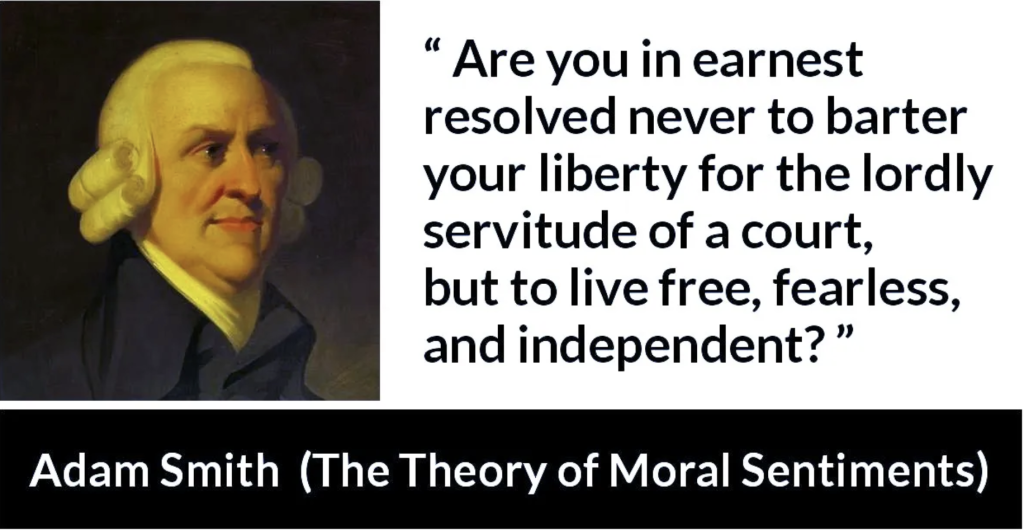
Please Follow us on Gab, Minds, Telegram, Rumble, Gettr, Truth Social, Twitter
Republicans will never become a majority party in Connecticut – or, indeed, anywhere else – unless they are able to reclaim what used to be called, in pre-neo-progressive days, the vital center of American politics.
The vital center has become far less vital than it had been in the waning days of Camelot, the morally enlightened administration of the John F. Kennedy administration.
Kennedy was a genuine liberal, in the fashion of John Locke, Adam Smith and the founders of the American Republic.
The founders of the American Constitutional Republic were intimately familiar with Smith’s writings. His 1759 book, The Theory of Moral Sentiments, written long before his seminal work, The Wealth of Nations in 1776, provided the underpinnings to his later works, including Essays on Philosophical Subjects in 1795, and Lectures on Justice, Police, Revenue, and Arms in 1763.
The works of Smith are less read in academic circles these days than, say, The Pedagogy of the Oppressed, a book written by Paulo Freire, a Brazilian Marxist, first published in English in 1970. The book is widely considered – even at Harvard, where Freire was invited to teach that all teaching as such was a form of oppression – as one of the primary texts of critical pedagogy. The book proposed a new Marxian connection between teacher, student and society.
The vital center of western politics, preceding and following Smith, was rooted in a shared, organic sense of moral values animating all else, including politics. Today, we say that politics “lies downstream from culture.” That is to say, it is culture that gives rise to politics. To assume the reverse is to place the cart before the horse.
However, reversing the importance of culture to politics is the animating idea of all authoritarian regimes. Caesar’s ambition throughout the ages always has been to use politics to change cultural perceptions. In totalitarian states, politics has been effectively deployed to change stubborn cultural presuppositions. Hitherto, Marx said of the Hegelian philosophers of his day, philosophers and historians have been content to describe accurately history and the history of philosophy, but the prime object of revolutionary Marxism is to change both.
The forced collapse of the Stalinist and Post-Stalinist world-order following the administration of President Ronald Reagan gave the lie to totalitarian overreach. The Soviet Union had run out of moral suasion long before it ran out, in Prime Minister Maggie Thatcher’s formulation, “of other people’s money.”
Smith is singularly unwilling to offer the sometimes despised rich a primacy of place in a free market economy.
“The rich only select from the heap what is most precious and agreeable,” he writes. “They consume little more than the poor, and in spite of their natural selfishness and rapacity, though they mean only their own conveniency (sic), though the sole end which they propose from the labours (sic) of all the thousands whom they employ, be the gratification of their own vain and insatiable desires, they divide with the poor the produce of all their improvements. They are led by an invisible hand to make nearly the same distribution of the necessaries of life, which would have been made, had the earth been divided into equal portions among all its inhabitants, and thus without intending it, without knowing it, advance the interest of the society, and afford means to the multiplication of the species.”
So long as the governing hand remains invisible in the countless free transactions that occur between consumer and seller, though apparent to those who have carefully read Smith’s The Wealth of Nations, freedom remains indivisible, quite beyond the reach of autocrats, dictators and tyrants. It is the ambition of tyrants everywhere to transform the invisible hand into a balled fist, the better to shape the nation’s moral presuppositions and its future. The iron hand of government autocracy has throughout the ages been hidden from middle class producers in velvet gloves.
At some point, the national and state Republican Party – no longer the party of the idle rich, whose contributions to an assisting government flow in equal measure towards the enablement of the party that holds power over them – must begin a reclamation process. And that process will be deeply rooted in a free market economy that is not captive to the agents of government.
Smith’s works are the high ground on which to mount rational howitzers manned by men and women who know that freedom is not to be attained by Washington D.C. suppliants. That is the undying message of the founders of the American Republic who constructed their novel experiment in liberty on the broad shoulders of apostles of liberty such as Smith.

